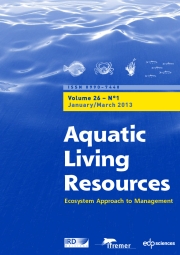Crossref Citations
This article has been cited by the following publications. This list is generated based on data provided by
Crossref.
Potier, Michel
Marsac, Francis
Cherel, Yves
Lucas, Vincent
Sabatié, Richard
Maury, Olivier
and
Ménard, Frédéric
2007.
Forage fauna in the diet of three large pelagic fishes (lancetfish, swordfish and yellowfin tuna) in the western equatorial Indian Ocean.
Fisheries Research,
Vol. 83,
Issue. 1,
p.
60.
Kim, Yong-Hae
2007.
Complex Movements of Skipjack Schools Based on Sonar Observations during Pelagic Purse Seining.
Journal of the Fisheries Science and Technology,
Vol. 10,
Issue. 4,
p.
220.
Kim, Yong-Hae
Park, Myeong-Chul
and
Ha, Suk-Wun
2008.
Simulation and Three-dimensional Animation of Skipjack Behavior as Capture Process during Purse Seining.
Journal of the Fisheries Science and Technology,
Vol. 11,
Issue. 2,
p.
113.
Potier, Michel
Romanov, Evgeny
Cherel, Yves
Sabatié, Richard
Zamorov, Veniamin
and
Ménard, Frédéric
2008.
Spatial distribution ofCubiceps pauciradiatus(Perciformes: Nomeidae) in the tropical Indian Ocean and its importance in the diet of large pelagic fishes.
Aquatic Living Resources,
Vol. 21,
Issue. 2,
p.
123.
Romanov, Evgeny
Potier, Michel
Zamorov, Veniamin
and
Ménard, Frédéric
2009.
The swimming crab Charybdis smithii: distribution, biology and trophic role in the pelagic ecosystem of the western Indian Ocean.
Marine Biology,
Vol. 156,
Issue. 6,
p.
1089.
Olson, Robert J.
Popp, Brian N.
Graham, Brittany S.
López-Ibarra, Gladis A.
Galván-Magaña, Felipe
Lennert-Cody, Cleridy E.
Bocanegra-Castillo, Noemi
Wallsgrove, Natalie J.
Gier, Elizabeth
Alatorre-Ramírez, Vanessa
Ballance, Lisa T.
and
Fry, Brian
2010.
Food-web inferences of stable isotope spatial patterns in copepods and yellowfin tuna in the pelagic eastern Pacific Ocean.
Progress in Oceanography,
Vol. 86,
Issue. 1-2,
p.
124.
Ménard, Frédéric
Potier, Michel
Jaquemet, Sébastien
Romanov, Evgeny
Sabatié, Richard
and
Cherel, Yves
2013.
Pelagic cephalopods in the western Indian Ocean: New information from diets of top predators.
Deep Sea Research Part II: Topical Studies in Oceanography,
Vol. 95,
Issue. ,
p.
83.
Béhagle, Nolwenn
du Buisson, Louis
Josse, Erwan
Lebourges-Dhaussy, Anne
Roudaut, Gildas
and
Ménard, Frédéric
2014.
Mesoscale features and micronekton in the Mozambique Channel: An acoustic approach.
Deep Sea Research Part II: Topical Studies in Oceanography,
Vol. 100,
Issue. ,
p.
164.
Alegre, Ana
Ménard, Frédéric
Tafur, Ricardo
Espinoza, Pepe
Argüelles, Juan
Maehara, Víctor
Flores, Oswaldo
Simier, Monique
Bertrand, Arnaud
and
Tsikliras, Athanassios C.
2014.
Comprehensive Model of Jumbo Squid Dosidicus gigas Trophic Ecology in the Northern Humboldt Current System.
PLoS ONE,
Vol. 9,
Issue. 1,
p.
e85919.
Humphries, Nicolas E.
Schaefer, Kurt M.
Fuller, Daniel W.
Phillips, Grace E.M.
Wilding, Catherine
and
Sims, David W.
2016.
Scale-dependent to scale-free: daily behavioural switching and optimized searching in a marine predator.
Animal Behaviour,
Vol. 113,
Issue. ,
p.
189.
Olson, R.J.
Young, J.W.
Ménard, F.
Potier, M.
Allain, V.
Goñi, N.
Logan, J.M.
and
Galván-Magaña, F.
2016.
Vol. 74,
Issue. ,
p.
199.
Sardenne, Fany
Diaha, N’Guessan Constance
Amandé, Monin Justin
Zudaire, Iker
Couturier, Lydie I.E.
Metral, Luisa
Le Grand, Fabienne
and
Bodin, Nathalie
2019.
Seasonal habitat and length influence on the trophic niche of co-occurring tropical tunas in the eastern Atlantic Ocean.
Canadian Journal of Fisheries and Aquatic Sciences,
Vol. 76,
Issue. 1,
p.
69.
Receveur, Aurore
Kestenare, Elodie
Allain, Valerie
Ménard, Frédéric
Cravatte, Sophie
Lebourges-Dhaussy, Anne
Lehodey, Patrick
Mangeas, Morgan
Smith, Neville
Radenac, Marie-Hélène
and
Menkes, Christophe
2020.
Micronekton distribution in the southwest Pacific (New Caledonia) inferred from shipboard-ADCP backscatter data.
Deep Sea Research Part I: Oceanographic Research Papers,
Vol. 159,
Issue. ,
p.
103237.
Escobar-Flores, Pablo C.
O’Driscoll, Richard L.
Montgomery, John C.
Ladroit, Yoann
and
Jendersie, Stefan
2020.
Estimates of density of mesopelagic fish in the Southern Ocean derived from bulk acoustic data collected by ships of opportunity.
Polar Biology,
Vol. 43,
Issue. 1,
p.
43.
Romanov, Evgeny V.
Nikolic, Natacha
Dhurmeea, Zahirah
Bodin, Nathalie
Puech, Alexis
Norman, Stewart
Hollanda, Stéphanie
Bourjea, Jérôme
West, Wendy
and
Potier, Michel
2020.
Trophic ecology of albacore tuna (Thunnus alalunga) in the western tropical Indian Ocean and adjacent waters.
Marine and Freshwater Research,
Vol. 71,
Issue. 11,
p.
1517.
Laptikhovsky, Vladimir
Naulaerts, Joachim
Clingham, Elizabeth
Collins, Martin A.
Cranfield, Martin
Henry, Leeann
Small, Alison
Stamford, Tammy
Xavier, Jose
and
Wright, Serena
2021.
Comparative feeding strategies of yellowfin tuna around St Helena and adjacent seamounts of the South Atlantic Ocean.
Journal of Applied Ichthyology,
Vol. 37,
Issue. 1,
p.
38.
Domokos, Réka
and
Godø, Olav
2021.
On the development of acoustic descriptors for semi-demersal fish identification to support monitoring stocks.
ICES Journal of Marine Science,
Vol. 78,
Issue. 3,
p.
1117.
Longo, Francesco
Malara, Danilo
Asciutto, Emanuele
and
Battaglia, Pietro
2023.
Growth of the Mesopelagic Fish Vinciguerria attenuata (Cocco, 1838) in the Strait of Messina (Central Mediterranean Sea).
Journal of Marine Science and Engineering,
Vol. 11,
Issue. 5,
p.
1055.
Wang, Yuan
Zhang, Jinhui
Yu, Jiancheng
Wu, Qiaoyan
and
Sun, Dong
2023.
Anticyclonic mesoscale eddy induced mesopelagic biomass hotspot in the oligotrophic ocean.
Journal of Marine Systems,
Vol. 237,
Issue. ,
p.
103831.
Kim, Sung
Chin, Byung-sun
and
Wang, Soon-young
2023.
Evidence of the Intrusion of the Oceanic Lightfish (Vinciguerria nimbaria) into Korean Waters Based on High-Throughput Sequencing of Mixed Fish Eggs.
Journal of Marine Science and Engineering,
Vol. 11,
Issue. 2,
p.
257.




